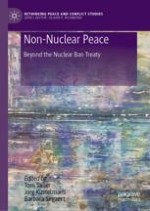2020 | OriginalPaper | Buchkapitel
2. Conceptions of the Bomb in the Early Nuclear Age
verfasst von : Casper Sylvest
Erschienen in: Non-Nuclear Peace
Aktivieren Sie unsere intelligente Suche, um passende Fachinhalte oder Patente zu finden.
Wählen Sie Textabschnitte aus um mit Künstlicher Intelligenz passenden Patente zu finden. powered by
Markieren Sie Textabschnitte, um KI-gestützt weitere passende Inhalte zu finden. powered by
